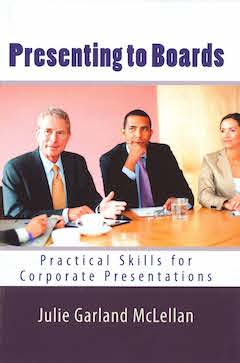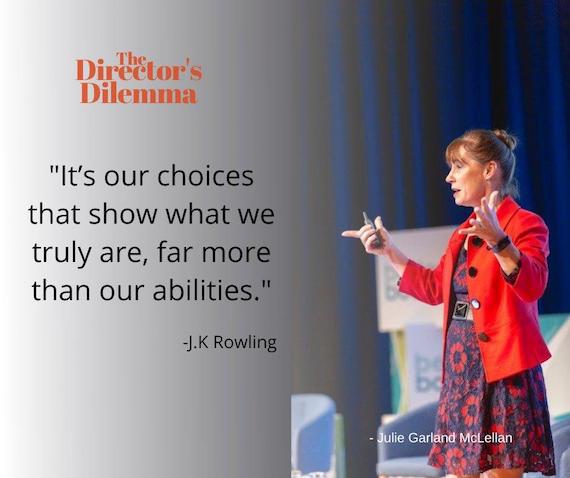|
|
|
|
|
|
|
|
|
Dear reader,
Welcome to The Director's Dilemma March 2023
Each month this newsletter looks at a real-life scenario that happened to a board, perhaps to a board like yours, and considers a range of responses. The scenarios are de-identified to protect the individuals concerned. This month we consider what to do when a founding CEO is wedded to a plan that seems to be failing financially and, instead of changing the plan, changes the CFO. In a break with tradition, we have an answer from a pair of directors working together. Board governance is a team sport!
Of course, scenarios in this newsletter are general, I work with boards and directors as a confidential mentor and help them beat challenges and seize opportunities. If you would like personalised service, please call me.
To read this email in a web browser, go to www.mclellan.com.au/newsletter.html and click on 'read the latest issue'. I hope you will enjoy the latest dilemma:
 Ava is a young director on the board of a recently founded company that operates a service platform using a 'freemium' model. Ava is a young director on the board of a recently founded company that operates a service platform using a 'freemium' model.
She was selected to join the board for her understanding of the software and technology infrastructure that the business uses. Since joining, she has undertaken a short course in directorship to round out her technical skills with some financial and legal nous. The course highlighted that directors should stay out of operations and allow the CEO to run the business, but Ava has concerns about financial performance and feels she is getting deflected when she asks questions.
The free platform is very popular and has had massive growth in users. Very few of these have converted to the paid service and even when offered free trial periods it seems hard to entice people to use more than the free version.
A few months ago, the CFO resigned. A new CFO, with three prior experiences in building profitable start-ups, was recruited. Ava was glad because he seemed to share her concern and talked about developing a more compelling 'upgrade to paid' offer.
After one week he too resigned and now the Founding CEO has said that he will take on both the CEO and CFO roles to reduce costs.
Ava suspects the CEO is more focused on growth in users than a path to profitability.
What should Ava do?
|
|
|
|
Shantanu's Answer

The board has been deflecting the issues Eva has raised. I am unsure how Eva's one-to-one meetings went with the chair of the board or the CEO or did she have one. The business is running at a loss. The customers are not turning from free to paid. However, the result of any root cause analysis is unclear. Also, Eva is unsure about the extent of her involvement in the business.
The financial health of the business is the foremost concern. Is the business solvent? What are the burn rate and the available runway with the funds? Solvency is an essential duty of the board. As a fallout, business profitability is a board duty. Hence, some strategic suggestions from the board would not be out of place.
I would like to know if a one-to-one meeting with the chair or the CEO is possible. If neither sees any value in discussing and the business is heading towards a bad crash, it might be time to depart or question the board's performance.
Let's assume people would listen. Firstly, establish if the product is ice cream or water to customers. Ice cream is great to have, but water is must-have. It appears to be ice cream. In that case, consider what could turn it into water. Also, sometimes, the features offered for free are enough for customers to live their whole life without paying for them. As a for-profit business, titrate the free feature offerings to give a taste but mandate an upgrade to make it work meaningfully.
Shantanu Bhattacharya MAICD is Founder, Chair, and CEO of Phone Pass Pty Ltd. He is based in Weston Creek, ACT, Australia.
|
|
|
|
Julie's Answer

It is one thing to understand the operation of a software platform. It is another to understand how the operation differs in a start-up compared to in an established self-sustaining business.
As a director, Ava needs to understand the business model and strategy. She is right to be concerned about the finances, which should be viewed in the context of the agreed strategy. What were the predicted rates for upgrade from free to paid use of the platform? Have any milestones been missed? Is the company on or off track? Is the company well run with few surprises or is it lurching from one event to the next with little predictability?
Ava should then consider the length of the runway (time that the company can keep operating before it becomes self-sustaining or needs more capital) and any options available for increasing runway. She should consider current and expected market conditions and the likely cost of capital, dilution, etc.
Finally, Ava should consider the CEO. Does the CEO have credibility with the investors as a CFO or only as founder? Does he or she have time to tackle both roles without omitting something important? Is the CEO coachable and well supported by expertise on the board? Is it logical to cut costs and combine the roles or does it look like turf-protection?
After doing her thinking, Ava should raise the issues with her chair and then with the rest of the board. It is the job of the whole board to lead the company and oversee the CEO. Ava is right to be concerned and needs to gain support for action or comfort with inaction.
Julie Garland McLellan is an experienced non-executive director and board advisor based in Sydney, Australia. She travels the world providing director education and board development.
|
|
|
|
Nathalie and Vincent's Answer
 
More than just a supervisory body, the Board is a partner of the Executive Management, with whom it shares strategic direction and may challenge some management decisions. As a Director of the Board, Ava has the right and the legitimacy to express and support an opinion that she has formed, and also to exercise her duty to be alert.
In the present case, we see several options Ava should consider:
-
With the Chairman's approval and the Audit Committee support, Ava should ask the CEO to present relevant risk scenarios to the Board. Assuming that this "upgrade to paid" offer and the related business plan have been presented to the Board and duly advocated; nevertheless the corresponding risk assessment should be updated regularly since it appears that this plan is crucial for the company. Ava is fully right to alert about financial performance of this plan. Risk assessment goes with the risk management plan the CEO is responsible for and which the Board has to challenge first and then to agree with.
-
Ava is concerned about the financial monitoring of the company; if Bylaws do not provide for, she may suggest the Chairman to request that the Board be involved with the recruitment of the CFO - and later on of any CCO, both being Key people for the development/recovery of the company.
-
Moreover, Ava may alert on the risk relating to the excess of duty of the CEO combining CFO responsibilities, and ask for a precise schedule of the CFO recruitment.
-
Last but not least, with full transparency vis-à-vis the Chairman, Ava should offer to intervene as a "technical" advisor to the CEO, bringing her experience in software and technology infrastructure to support (the definition and )the execution of the plan that has been decided previously.
Nathalie Deroche and Vincent David are both Partners of Leaders Trust France / AltoPartners France. Nathalie is also an Operating Partner at Tikehau Capital and a former director of Passerelles et Compétences. Vincent is a former Partner and Founder of Global Technology and Digital Practice at Comitis & Associés. Both are based in Paris, France.
|
|
|
|
Video resources - Readers who follow me on LinkedIn may have noticed that I post short video insights. They disappear from LinkedIn after a few days. You might like to visit (and please subscribe to) my YouTube channel to see the videos whenever you want to watch them. They are in three lists:
-
'Quick Insights' up to three minutes long
-
'Board Thoughts' three to ten minute informal comments giving my take on current board issues, and
-
'Presentations and Classes' up to an hour long.
Choose how much time you want to invest. Let me know if there are any topics you would like to see addressed.
Let's meet in person - I will be at the AICD Australian Governance Summit in Melbourne on 1 and 2 March. I will also be at the Better Boards conference in Brisbane on June 2 and 3. Please come and say hello if you see me there. I always love meeting new people and catching up again with ones I have met before.
Book Review - Presenting To Boards: Practical Skills For Corporate Presentations by Julie Garland McLellan
 A book of practical skills and tips for making successful board presentations. A book of practical skills and tips for making successful board presentations.
Much is at stake when one makes a Boardroom presentation. Presenters are asking for consideration and decision-making at the highest level; gaining acceptance of new strategic proposals; making high-level sales involving significant investments; or building shared understanding and common identities. The ability to present effectively to boards is often important to career success.
Yet presenters are often unaware of the dynamics acting upon a director. Board protocols, behaviours, and legal liabilities may be very different from those in executive life. Understanding the boardroom environment is therefore fundamental to presentation success.
Written by an internationally acclaimed expert on corporate governance and filled with real life anecdotes and helpful tips, this book is a 'must read' for any executive who aspires to succeed in presenting at the highest corporate level.
Available at Amazon.com.au and Amazon.com
Inspirational quote for March

Sometimes directors make tough choices. Even if you are relatively new in the role, it is important to speak up and work through any issues that arise.
A note on names - A few readers have asked me where I find the names for the protagonists in each case study; I 'borrow' them from people I meet or things that I read. In both Persian and Urdu, Ava means "voice." In Hebrew, the name Chavah means "life." In Latin, "avis" means "bird". Our protagonist Ava must find and use her voice in the boardroom to ensure that she keeps the company alive and able to attract funding until it is self-sustaining. She cannot allow the CEO/Founder to scare her away from this mission.
This newsletter - If you have any ideas for improving the newsletter please let me know. If you are reading a forwarded copy, please visit my website and sign up for your own subscription.
Let me help you - I would be delighted to speak for or train your board, staff, audience and/or group. If I can help, please contact me at julie@mclellan.com.au.
Suggestions for dilemmas - Thank you to all the readers who have suggested dilemmas. They are greatly appreciated. I will answer them all eventually. I could not write this newsletter without your help and without the generous help of all the experts who respond each month to the case studies.
Be a contributor - if you would like to attempt a response to the dilemmas for publication you will be most welcome. Simply reply to this email and let me know. I am always on the lookout for new talent from around the world so please reach out if that sounds like something you could do. I am also always grateful for the generous sharing of the current and past contributors. I couldn't create such an engaging newsletter without their help.
Let's connect - I use LinkedIn to share information about boards and directorship with my friends and acquaintances. If you use LinkedIn and we are not yet connected I will welcome a connection from you. You can find me at linkedin.com/in/juliegarlandmclellan.
Farewell until the next issue due 1 April. I look forward to greeting you again then.
Enjoy governing your companies, it is a privilege!
Best regards,
Julie

Main photo by Energepic.com
Quote illustration by Julie Garland Mclellan
Disclaimer: The opinions expressed above are general in nature and are designed to help you to develop your judgement as a director. They are not a definitive legal ruling and do not constitute legal advice. Names and some circumstances in the case study have been changed to ensure anonymity. Contributors to this newsletter comment in the context of their own jurisdiction; readers should check their local laws and regulations as they may be very different.
Privacy: I am privileged to have your contact details and keep them as safely as possible. I will alert you if they are ever accessed by any unauthorised person (the technical staff at ayuda help with publishing and issuing the Director's Dilemma and have access so they can send the newsletters to you). I do not sell your details to anyone; they are kept only for the intended purpose - sending you this newsletter and helping to build the judgement of company directors by providing a safe way to consider potential responses to real life events.
|
|
|
|
|
|
|
 Ava is a young director on the board of a recently founded company that operates a service platform using a 'freemium' model.
Ava is a young director on the board of a recently founded company that operates a service platform using a 'freemium' model.






